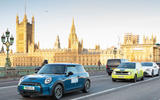The UK government is planning to introduce a new mandate requiring manufacturers to sell an increasing percentage of zero emission vehicles each year from 2024 onwards as part of its new Net Zero Strategy.
The government has already announced a ban on the sale of all new non-zero emission cars – with the exception of a limited number of hybrids – from 2030 onwards, and the new zero emission vehicle (ZEV) mandate will help to speed that transition by forcing car firms to make EVs account for an increasing large part of their fleet.
The ZEV mandate, which has been approved following a public consultation, will complement the existing system of giving car firms a fleet-average CO2 emissions target. It is understood the government has been considered that system was reliant on WLTP fuel economy figures that don’t always reflect real-world usage.
Investment promised in industry and charging infrastructure
In the Net Zero Strategy the government has pledged to ensure the nation's charging network is "reliable, accessible, and meets the demands of all motorists", and says it will to publish a full EV infrastructure strategy later this year.
The government also says it will spend an extra £620 million to support the transition to electric vehicles by increasing the rollout of charging infrastructure "with a particular focuson local on-street residential charging, and targeted plug-in vehicle grants."
It has also pledged to build a "globally competitive" zero emission vehicle supply chain, and to ensure the UK automotive sector is "at the forefront of the transition to net zero".
Another significant move is a pledge to increase average road vehicle occupancy by 2030, which is tied to reducing "the barriers to data sharing" across the transport sector.
2040 sales ban on all new non-zero emission vehicles
The government has also pledged to bring forward a ban on all new non-zero emission road vehicles – which would include motorcycles, buses and goods vehicles, to 2040, pending a public consultation.
In a bid to lead by example, the government has pledged to make a quarter of its car fleet ultra low zero emission by the end of 2022, and its car and van fleet fully zero emission by 2027.
READ MORE






Add your comment